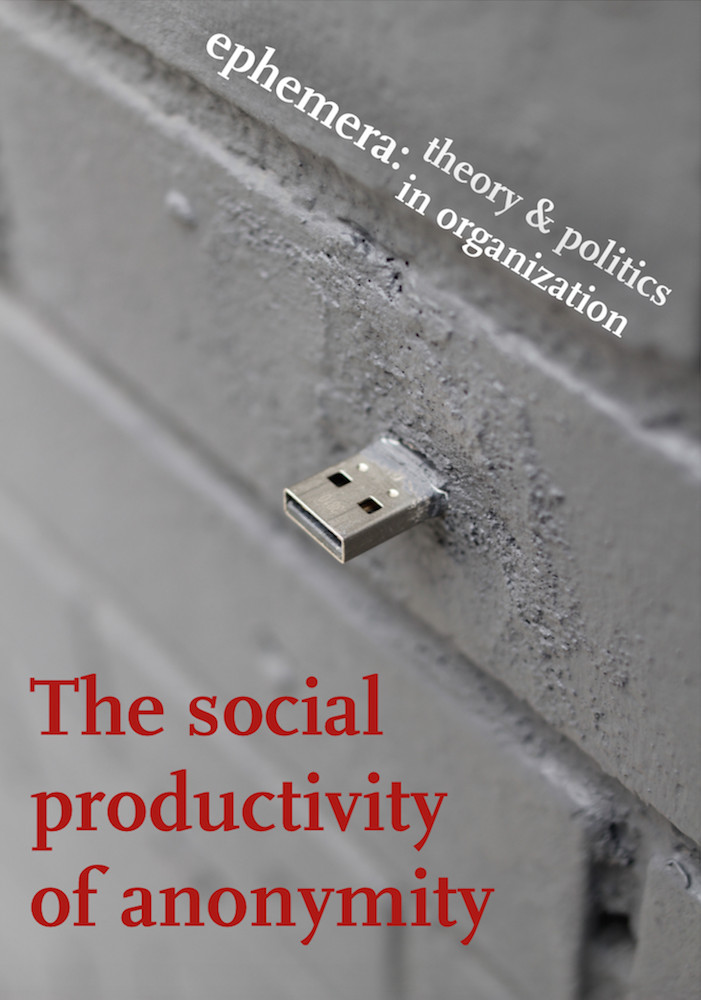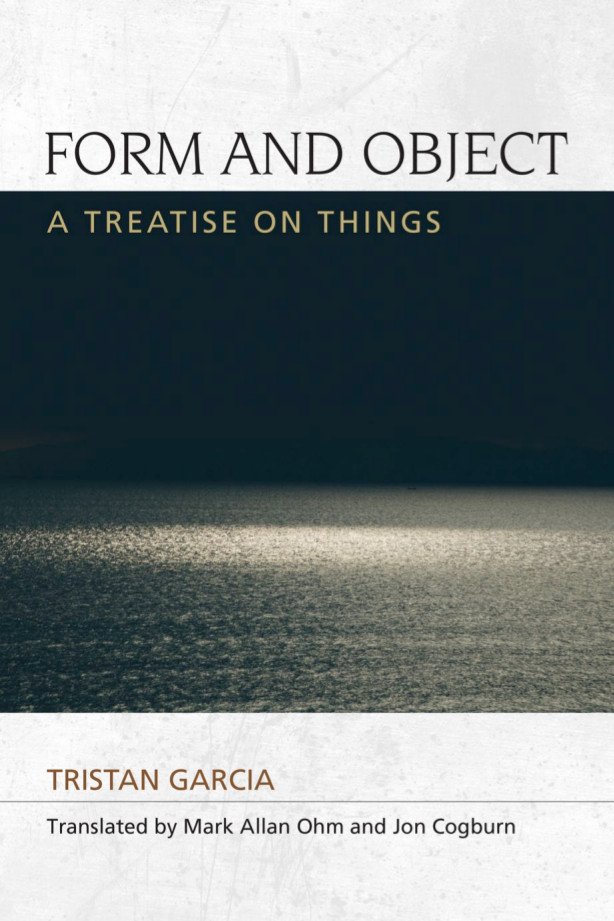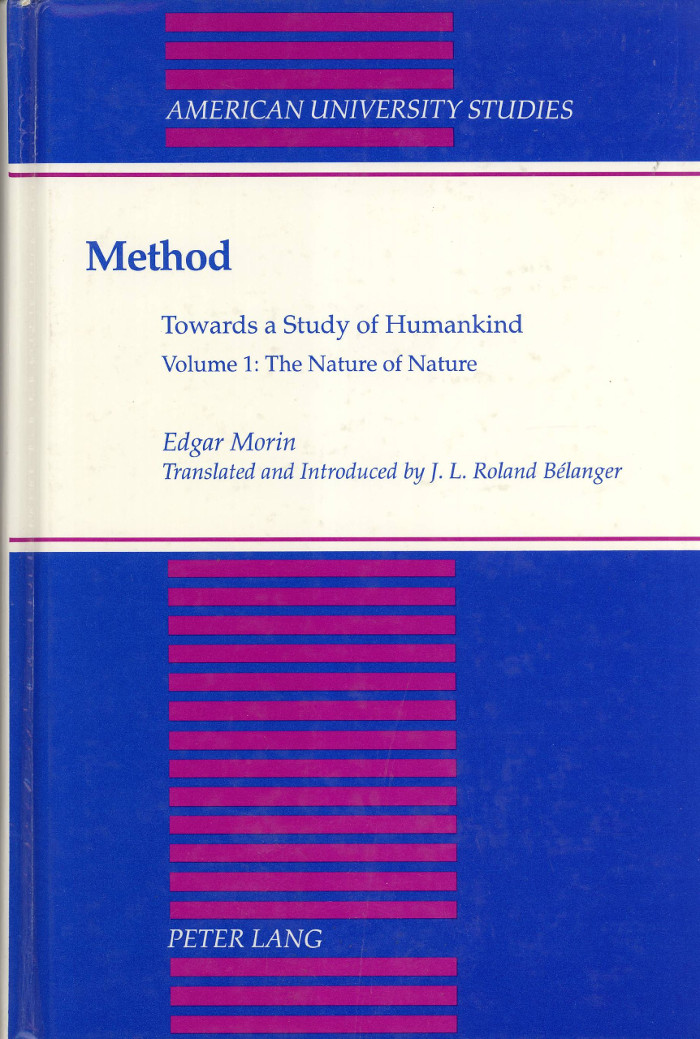Ephemera, 17(2): The Social Productivity of Anonymity (2017)
Filed under journal | Tags: · anonymity, internet, self

“In a process that started decades ago, a multiplicity of forces is creating a slow, but steadily rising storm against anonymity. Discourses of transparency and accountability often describe anonymity as a threat. Technologies such as the IP-address-based Internet, sensory devices, and machine learning techniques further undermine anonymous encounters. In an age of near ubiquitous surveillance, anonymity is under attack. But what is at stake in such discourses and developments? Based on the premise that anonymity is always socially productive and always socially produced, this special issue draws attention to anonymity as a social form that demands renewed attention. The contributions explore its temporalities, its transformative powers, and its entanglements with public spheres, property relations, and practices of person making.”
Publisher Ephemera collective, with MayFlyBooks, May 2017
Creative Commons Attribution-Noncommercial-No Derivative Works 3.0 Unported License
ISBN 9781906948375
220 pages
Tristan Garcia: Form and Object: A Treatise on Things (2011–)
Filed under book | Tags: · animal, art, being, body, culture, economy, event, evolution, form, gender, human, knowledge, life, metaphysics, nature, nothing, object, ontology, philosophy, relation, representation, self, thing, time, value

“What is a thing? What is an object? Tristan Garcia aims to overturn 100 years of Heideggerian orthodoxy about the supposedly derivative nature of objects to put forward a new theory of ontology that gives us new insights into the world and our place in it.
Garcia’s original and systematic formal ontology of things strips them of any determination, intensity or depth. From this radical ontological poverty, he develops encyclopaedic regional ontologies of objects. By covering topics as diverse as the universe, events, time, the living, animals, human beings, representation, arts and rules, culture, history, political economy, values, classes, genders, ages of life and death, he shows that speculative metaphysics and ontology are alive and well.”
First published as Forme et objet. Un traité des choses, PUF, Paris, 2011.
Translated by Jon Cogburn and Mark Allan Ohm
Publisher Edinburgh University Press, 2014
ISBN 0748681493, 9780748681495
462 pages
On Graham Harman’s System and My Own by Garcia (2013), Harman’s response.
Interviews with Garcia: by Liam Jones (Figure/Ground, 2014), Philosophical Readings (2014).
Reviews and commentaries: Jean-Clet Martin (2012, FR, ES), Harman (Continent, 2012), Nathan Brown (Radical Philosophy, 2014).
Wikipedia (FR)
Publisher
WorldCat
PDF, PDF (updated on 2018-5-8)
Comment (0)Edgar Morin: Method, vol. 1: The Nature of Nature (1977–) [PT, EN, ES]
Filed under book | Tags: · anthropology, being, biology, chaos, complexity, cybernetics, epistemology, event, generativity, human, information theory, knowledge, machine, methodology, nature, organization, physics, politics, recursion, self, sociology, systems theory

“Method: The Nature of Nature is the first of several volumes exposing Edgar Morin’s general systems view on life and society. The present volume maintains that the organization of all life and society necessitates the simultaneous interplay of order and disorder. All systems, physical, biological, social, political and informational, incessantly reshape part and whole through feedback, thereby generating increasingly complex systems. For continued evolution, these simultaneously complementary, concurrent, and antagonistic systems require a priority of love over truth, of subject over object, of Sy-bernetics over cybernetics.”
First published in French as La Méthode, t. 1: La Nature de la nature, 1977.
English edition
Translated and Introduced by J.L. Roland Bélanger
Publisher Peter Lang, 1992
ISBN 0820418781
435 pages
Interview with Morin by his translator Ana Sánchez, 2011
Publisher (EN)
WorldCat (EN)
O método 1. A natureza da natureza (Portuguese, trans. Maria Gabriela de Bragança, 2nd ed., c1987, 12 MB)
Method, 1: The Nature of Nature (English, trans. J.L. Roland Bélanger, 1992, 17 MB)
El método 1. La naturaleza de la naturaleza (Spanish, trans. Ana Sánchez and Dora Sánchez García, 2001, 4 MB)

